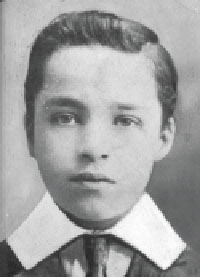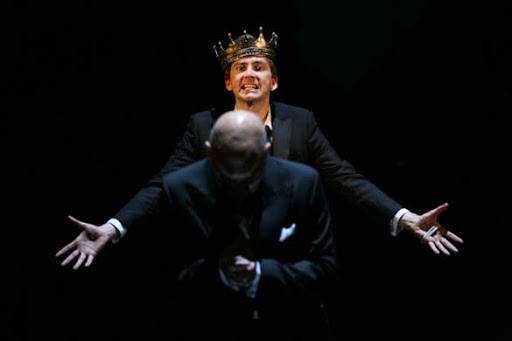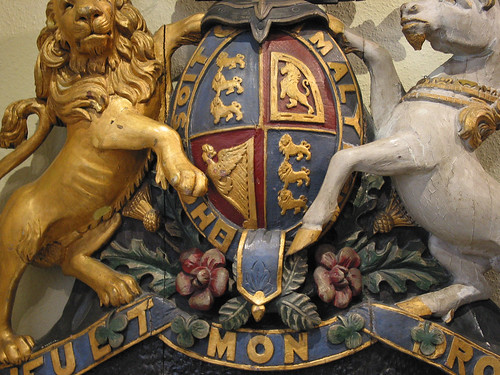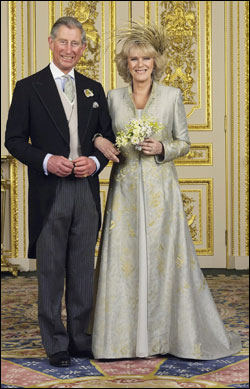and Shakespeare’s first history play.
It’s a sort of weird brace of metaphor for:
‘THE FIRST PART OF THE CONTENTION BETWIXT THE TWO FAMOUS HOUSES OF YORK AND LANCASTER’.
During the Olympics I couldn’t help thinking of the way in which people were investing the participants with a sort of representative nationality – by this I mean they became like the ‘coronated’ king (yes, I know the word should be crowned but I wanted to ‘mark’ the idea); the sporting hero went out as a single champion (even if they were in a team) and fought not so much for a national pride as for that part of ‘me’ I had deposited in the symbol of ‘you’.
A bit abstract maybe ….
It was easy with Thorpe: Henry V if ever there was one. What a hero, what a fund of pride … and strangely, like Shakespeare’s Henry V, his magnificent success transcended any nationalism. By the end, all but the meanest minded wanted him to succeed … even if at the expense of ones own favourite. Bolt was more a Hal than a grown king – his antics not quite mature.
For Henry VI there were a number of contenders … we need a sportsman who shows a lot of early promise but who hasn’t quite lived up to them. The obvious contender is the British diver, young Mr Tom Daley: The build up he got, the press coverage and the general media attention lead a lot of people to expect … and what a flop (except, it wasn’t …) ! No medal, lost hopes, wasted investment.
 No blame to the young man himself – it was our over expectation, our unsolicited demands, our unreasonable faith in a maturing boy … sound familiar? Henry VI is expected to perform in the same way … especially in competition with
No blame to the young man himself – it was our over expectation, our unsolicited demands, our unreasonable faith in a maturing boy … sound familiar? Henry VI is expected to perform in the same way … especially in competition with
But the Henry VI of this play is not Mr Daley - he is older … maybe Tom is the Henry of Henry VI Part 1. (And I want to make it very clear the boy done good – I am talking here of the expectations of others and the disappointment their wrong placed expectations result in.)
We need to look for an older, high expectation, low performance competitor … someone like Andy Murray?
 Tennis got a bit of a rough ride from the English sporting press (well it might) for not really being an Olympic sport … there are much more important events for it than the Olympics (bet Mr Nadal and certainly Mr Federer would beg to differ). Murray wasn’t taking the competition seriously, he hadn’t prepared, he was focussed elsewhere. He thought he could swan in and get somewhere reasonable and people would be happy …
Tennis got a bit of a rough ride from the English sporting press (well it might) for not really being an Olympic sport … there are much more important events for it than the Olympics (bet Mr Nadal and certainly Mr Federer would beg to differ). Murray wasn’t taking the competition seriously, he hadn’t prepared, he was focussed elsewhere. He thought he could swan in and get somewhere reasonable and people would be happy …
Now, that is more like the Henry VI of the ‘First Contention’. Henry is more focused on the
But we are stuck with Murray – he’s the English number one, but there are obviously much better foreign princes and real monarchs out there … he is never going to perform, not even at home.

But, hold on, he’s not English … he’s really not entitled to the job of representing me … isn’t there someone else with a better right to do that?
Welcome to the American Political Conventions!
 In the
In the
Not so in the quaint old US of A!
The conventions (origin: with talk although I had hoped it was with wind) are back to back speech making getting prime time coverage and swamping a nation already deaf to meaning with more meaningless but impassioned sounds.
And we are back to Shakespeare’s play.
As soon as Henry enters, his warm-up man,
 The new Queen throws in a similar but more fawning speech … great to be here, happy with the husband and the land (Mrs Obama or what? – God Bless
The new Queen throws in a similar but more fawning speech … great to be here, happy with the husband and the land (Mrs Obama or what? – God Bless
But this is not the convention of today … this is a ‘certain loser’ convention. As soon as the candidate leaves the stage the speeches of descent start – each speaker jockeying for position.
I will watch the Republican convention with interest …


 in earlier productions) was as Oberon - and Theseus ... and my costume was on hire from the RSC - as worn originally by ...Ian Richardson, I am not sure - but I think it was the one worn in the production Judy Dench played Titania and Helen Miren one of the lovers - so my costume 'big' resonance.
in earlier productions) was as Oberon - and Theseus ... and my costume was on hire from the RSC - as worn originally by ...Ian Richardson, I am not sure - but I think it was the one worn in the production Judy Dench played Titania and Helen Miren one of the lovers - so my costume 'big' resonance. struck down with TB. She always claimed to have been pushed in her pram by a young Charlie Chaplin and his brother Sid - but after she died we discovered it wasn't her but her older sister, Madge, who had that honour ... my grandmother, also invalided off the stage ran a 'guest house' for Music Hall performers in Manchester.
struck down with TB. She always claimed to have been pushed in her pram by a young Charlie Chaplin and his brother Sid - but after she died we discovered it wasn't her but her older sister, Madge, who had that honour ... my grandmother, also invalided off the stage ran a 'guest house' for Music Hall performers in Manchester.
 n Globe - quite by accident. I was on holiday in London and had heard the place was opening ... went along with a friend to see it and they were selling tickets ... so, we bought a couple for the yard and that was it ... i was one of many, my friend, the first Romanian ever to see a production at the Globe!
n Globe - quite by accident. I was on holiday in London and had heard the place was opening ... went along with a friend to see it and they were selling tickets ... so, we bought a couple for the yard and that was it ... i was one of many, my friend, the first Romanian ever to see a production at the Globe!
 in the afternoon; a quick dash to ‘
in the afternoon; a quick dash to ‘ I have to start out by making it clear, it was the BBC production of the three Henry VI Plays which got me hooked on the History plays - yes I knew Henry V and Henry IV Part 1, I'd endured Richard the Second and seen
I have to start out by making it clear, it was the BBC production of the three Henry VI Plays which got me hooked on the History plays - yes I knew Henry V and Henry IV Part 1, I'd endured Richard the Second and seen  The three plays as a sequence I will leave until later on - possibly when I have finished the three Henry VIs, possibly when I look at the whole of the history plays.
The three plays as a sequence I will leave until later on - possibly when I have finished the three Henry VIs, possibly when I look at the whole of the history plays. There is a disappointment - it is as if you were to discover the fireworks opening the Beijing Olympics were a computer trick, or the cute girl
There is a disappointment - it is as if you were to discover the fireworks opening the Beijing Olympics were a computer trick, or the cute girl  singing the Chinese national anthem was miming to someone else's voice.
singing the Chinese national anthem was miming to someone else's voice.
 And what colours and materials soon fill the stage!
And what colours and materials soon fill the stage! Earth, wedding Henry is a holy marriage.
Earth, wedding Henry is a holy marriage.






